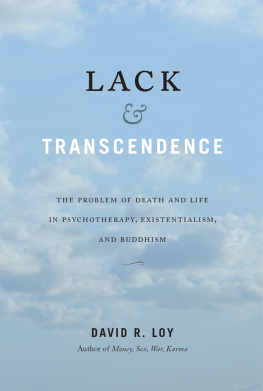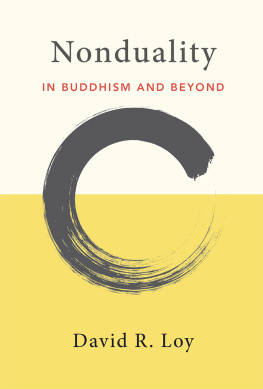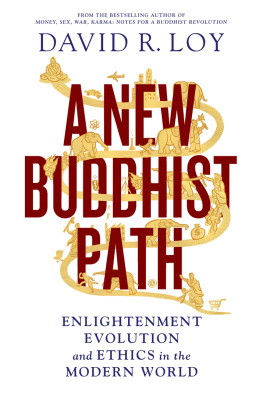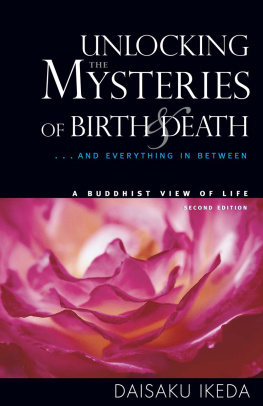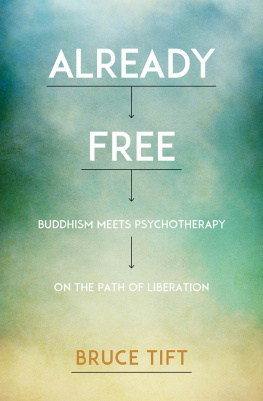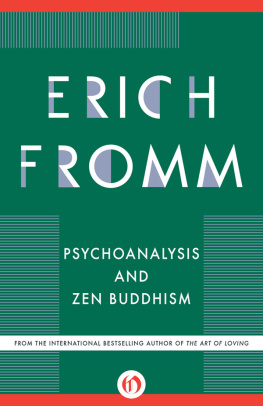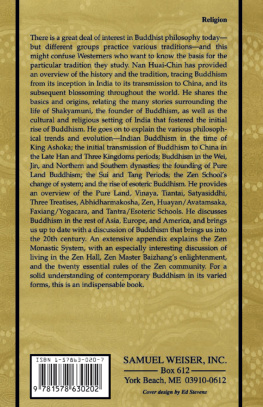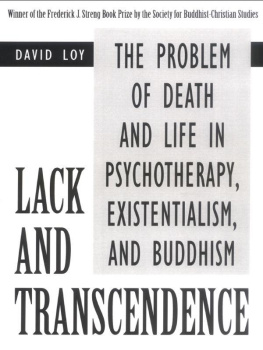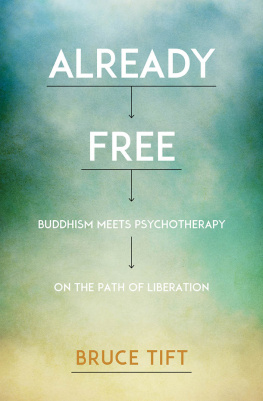
A PHILOSOPHICAL MASTERPIECE . D AVID R. L OY IS ONE OF THE MOST IMPORTANT THINKERS OF TIME .
NIKOLAJ ROTNE, cofounder of The Stillness Revolution and coauthor of Everybody Present

P SYCHOTHERAPY, EXISTENTIALISM, AND BUDDHISM are all concerned with the same fundamental issues of life and death and death-in-life. David R. Loys groundbreaking claim is that the unifying feature connecting these perspectives is a pervasive sense of dissatisfaction or, in a word, lack. In Lack and Transcendence, he brings all three traditions together in a way that casts new light on each, as he draws from giants of psychotherapy, particularly Freud, Ernest Becker, Rollo May, Irvin Yalom, and Otto Rank; great existentialist thinkers such as Nietzsche, Kierkegaard, Heidegger, and Sartre; and the teachings of Buddhism, especially as interpreted by Nagarjuna, Huineng, and Dogen. Written in an accessible style that does not assume prior familiarity with any of its subjects, this book will appeal to readers of all backgrounds, including psychotherapists and psychoanalysts, religious scholars, Continental philosophers, and anyone seeking clarity on the Great Matter itself.
The reader will come away with fresh perspectives on ancient questions and deeper insights into the human predilection to be unhappy and what the liberating alternative may be.
Brilliant. Loy plumbs the deepest and widest implications of the Buddhas no-self doctrine as far as, and sometimes farther than, words can convey.
PHILIP NOVAK, author of The Worlds Wisdom
A profound book that shows how the root of human suffering is a state of groundlessness that either gives rise to anxiety and despair or, when fully met, becomes a stepping-stone on the path of spiritual awakening.
JOHN WELWOOD, author of Toward a Psychology of Awakening
A major contribution. With his usual clarity and elegance, David R. Loy covers the social, psychological, technological, economic, and political aspects of his topic. There are few scholars in todays world capable of this feat.
JONATHAN GARB, Gershom Scholem chair in Kabbalah, Hebrew University
To Linda Goodhew
who wants it to have a happy ending
and Brigitte DOrtschy
who showed us it can
PREFACE TO THE WISDOM EDITION
THIS BOOK ORIGINATED in an unusual way.
In the late 1980s I was living in Japan and focused on my Zen practice at the SanUn Zendo in Kamakura. I was also reading everything I could about death, not only Buddhist and other spiritual texts but as much of the relevant psychological and philosophical literature as I could find. By far the most insightful and provocative books were the last two by the existential psychologist Ernest Becker: The Denial of Death, which received the Pulitzer Prize for nonfiction in 1975; and his unfinished Escape from Freedom.
According to Becker, our inability to accept our inevitable death is also our inability to live fully. Death is so terrifying that we must repress it, yet that doesnt work very well. As Freud discovered, what has been repressed tends to return to consciousness in distorted form, as a symptom in this case, as obsessive immortality projects in which we try to immortalize ourselves symbolically. Physical death may be unavoidable, but by becoming someone special one can hope to qualify for a special fate. Maybe by writing a great philosophy book, in which case ones words and name might survive?
But I couldnt avoid Beckers main point so easily. It was a painful shock to realize how much my Zen practice was full of gaining ideas. Rather than meditating single-mindedly, I was using zazen as a means to reach some other goal to become deeply enlightened. What could be more special than that? Maybe even to become a great Zen master! Hui-neng, Ma-tsu, Dgen, Hakuin, and... David Loy? Instead of forgetting myself in the practice, this attitude reinforced my sense of self. In short, my Zen practice had become another kind of immortality project.
The ground beneath my feet disappeared, yet eventually, as the sadness and disorientation eased, there was the taste of a new kind of freedom. I didnt need to play that game anymore. Although my often-awkward self-consciousness and feelings of inadequacy didnt disappear, they didnt matter so much, because at my core something else had opened up.
It certainly felt like this transformation was influenced by what Becker had written, but the result was not something that Becker had described. And, from a Buddhist perspective, it now seemed to me that Beckers basic claim was a little off-focus: that our fundamental problem is not death (sometime in the future) but our lack of self-existence right now. I continued my zazen, along with my studies. At that point I had no idea what they might lead to, yet commitment to both was still intense.
A year or so later, I sat down to write a teisho, a Zen talk. A Zen teacher had asked me to write one, but I had no particular topic in mind. I duly wrote down a desultory sentence or two, and then something completely unexpected happened. A fresh thought about what I had been reading arose in my mind I wrote it down. As soon as I finished recording it, another thought appeared. I wrote that one down. Another thought, and then another. To my surprise, they kept coming, for hours. As quickly as I could write one thought down, the next one appeared. Each arose spontaneously, as if it had a life of its own. There was no mental effort involved, nor was there any particular logical sequence in the way the thoughts appeared. They jumped from one theme to another.
This continued for more than two days (with the usual breaks for eating and sleeping). Near the end of that time, as the thoughts slowed down, I went back over my notes and reread what Id written down so hastily; that led to more thoughts, which now began to link the previous thoughts together. After another day or so, the detailed structure of a book had emerged this one.
Of course, that was just an outline. After that the real work began, fleshing out the arguments and tying them together discursively. But I already knew what I wanted to say or, more precisely, what wanted to be said, because it really felt like this book had a life of its own and that my task was to midwife its birth.
Since then I have published many other books, but this remains my favorite. Its central idea that the sense of self is normally haunted by a sense of lack, the feeling that something is wrong with me still seems to me quite important, and I continue to explore its implications. It helps us understand why we individually tend to become so obsessed with money, fame, status, and our physical appearance among other things. It also has collective social implications that have been developed in some of the other books I have written.
Very few changes have been made in the text of this second edition, none of them substantial, mostly stylistic. Occasionally I have added a few words to clarify a point, but that is all. Many of the pronouns are not gender-neutral, but at this point it would be difficult to correct all of them.
I am very grateful to Wisdom Publications for making Lack and Transcendence available in this more affordable and readable edition.
ACKNOWLEDGMENTS
MATERIAL FROM EARLIER DRAFTS of this book has been incorporated into the following papers. Permission from the following journals and publishers to reprint this material is gratefully acknowledged.
The Nonduality of Life and Death: A Buddhist View of Repression, in
Next page
